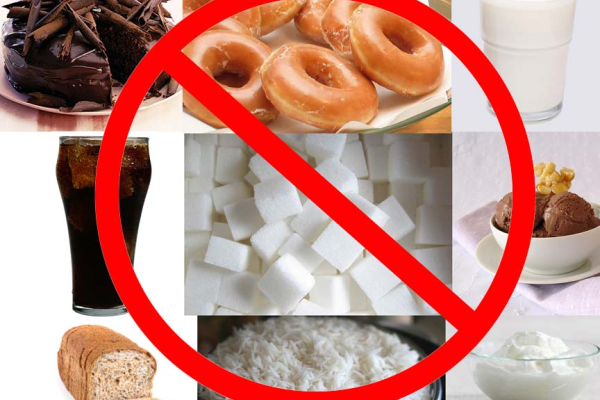
We’re all so accustomed to seeing ‘low-carb’, ‘carb-free’, and ‘sugar-free’ written on food packaging, and numerous people I know decide to embark on a ‘no-carb diet’ to prepare for weddings, beach holidays and other special occasions. But despite this obsession with avoiding carbs at all costs, the Western World is in the grips of an obesity epidemic, coupled with the consistent rise of devastating degenerative diseases. And with food companies bombarding us with conflicting information on what to eat, it is no wonder that so many people are deeply confused about what they should and should not be eating for optimal long-term health and weight management.
First things first. Carbohydrates are one of the three main macronutrients, along with fat and protein, meaning they are essential to eat for survival. They provide us with the necessary energy to keep all of our biochemical functions running efficiently. Unlike true carnivores, human saliva contains the enzyme amylase, which facilitates the breakdown of starch into sugars, indicating that we are designed by nature to eat carbohydrates. As we are mostly all aware, many popular diets have demonised carbs and made carb-counting popular. However, I would really like people to reconsider what they’ve been told by diet books and forced to believe by food marketing, and give carbs a second chance.
Carbs uncovered
There are three types of carbohydrates: Complex, simple and fibre. Complex carbohydrates, which can also be called starches, include whole and unrefined grains, vegetables and fibre-rich root vegetables. Simple carbs offer a quick burst of energy to the body. These include refined starches and sugars, such as white flour and sugar, and fruits. Finally, fibre is a complex carbohydrate that is undigested by our body but is essential for both intestinal and overall health as it helps to move food through the gut by peristalsis and to sweep through damaging toxins for excretion.
Refined carbohydrates are what we should be avoiding as much as possible. These include white-flour breads, pastas, pastries, white rice, crisps, many breakfast cereals, and most packaged foods, such as biscuits, cakes, crackers and baked treats. The refinement process used to produce these foods removes the bran and germ of the grain, which depletes it of fibre and many of the vitamins, minerals and other nutrients. Other refined sugars to avoid include sucrose, lactose, molasses, fruit juice concentrates and high-fructose corn syrup. Refined sugar is one of the most damaging foods you can eat as it creates extreme fluctuations in energy, intense cravings for another sugar hit, and emotions including anxiety, depression, anger and negativity.
As refined carbs contain very little fibre, they cause a surge in blood sugar levels, an insulin response from the pancreas to control these blood sugar levels, and an emotional and physical rollercoaster of sugar highs and lows. Forcing the pancreas to consistently produce insulin may eventually lead to insulin resistance, which has been associated in numerous clinical trials with obesity and a myriad of disease states. In complete contrast, complex carbs contain plenty of fibre, which means that they take longer for the stomach to digest, release their glucose slowly into our bloodstream, and keep us satiated for a much longer period of time.
Fruit and sugar
I am often asked about the sugar in fruit, as many popular diets would also have us believe that fruit will cause excess blood sugar levels and weight gain. Fruit is one of the most life-enhancing foods we can eat as it is extremely alkalising, contains a high water content, essential amino acids, minerals, vitamin and fatty acids. After vegetables, it is the lowest food in terms of calorie-density. Whole fruits are high in fibre, leave no toxic metabolic residue and provide us with immediate energy. Their fibre also slows down the entry of fructose into the blood, whereas fruit juice gives an immediate hit. Fruit also helps to dissolve toxins in our blood and tissues, and cleanse our system. However, fruit is best digested and metabolised when our system is at its most balanced and the gut contains plenty of beneficial bacteria.
For anyone who finds it difficult to digest fruit, has a candida imbalance or suffers from bloating, burping or stomach pain after consumption, I would always advise to start by eating lower sugar fruits such as blueberries, strawberries, kiwis, grapefruit, blackberries and raspberries, and to build up their healthy intestinal flora by taking probiotics and consuming fermented foods daily, such as sauerkraut and kimchi. Adopting a more alkaline and plant-based diet will also help to improve intestinal flora and digestive health.
Don’t fill up on fat
Per gram of both carbohydrate and protein, there are just four calories. But a gram of fat contains 9 calories. That’s over twice the amount of energy in fat than in carbs and protein. If you are going to strictly avoid carbs, then you will have to make up the calories elsewhere. While protein is of course essential, most people reach for animal protein to fill them up, which is void of fibre, many vitamins, phytonutrients and antioxidants, all crucial for lowering the risk of cancer and heart disease. Excess animal protein is also complex to digest, creates metabolites as by-products of digestion, which can be damaging to the liver and kidneys, and enables an acidic internal environment, which encourages the proliferation of body cells and potentially malignant tumours. Not ideal! So I have witnessed many carbohydrate-avoiders eating excessive amounts of fat just to feel full. As tasty as fat can be, it is far too easy to overeat, causing potential weight gain, and saturated fats, trans-fats and cholesterol are especially damaging to the body.
Good carbs to satiate hunger
There are numerous kinds of complex carbohydrates that can satiate hunger, deliver a great package of fibre and nutrients, and that won’t spike your blood sugar levels. These include whole fruit and vegetables, whole intact grains such as oats, quinoa and brown rice, legumes and starchy vegetables. I aim for my diet to be at least 70 percent healthy carbohydrates and usually more, as this way I get the best results in terms of fitness, immunity and energy. I keep my protein intake to a sensible level, which ensures I get all the essential amino acids I need on a daily basis but not in excess. Plus it is all plant protein, which is generally easier to digest and assimilate than most forms of animal protein and contains fibre, vitamins and minerals.
I keep my fat intake low and just the essential fats I need, from flaxseeds, chia seeds, hemp seeds and smaller amounts of avocado or nuts. This enables me to increase my carbohydrate intake to boost energy levels and satiety without overdoing the calories. The types of carbs I love to eat are mostly complex and nutrient-dense – plenty of whole fruit and vegetables, homemade fruit smoothies, whole gluten-free grains including millet, quinoa, brown rice and oats. I also love starchy vegetables like butternut squash, pumpkin and sweet potato, which are tasty and satisfying as a mash, in a hearty soup or simply oven-roasted as chilly autumn days are fast approaching. Delicious!

